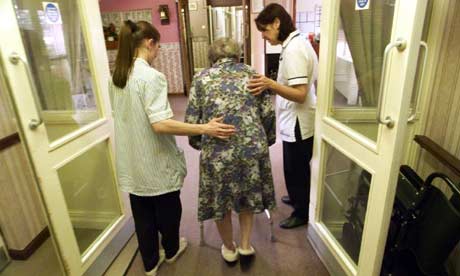Almost half of those who care for people with Alzheimer's receive no help from social services, have little or no respite care and frequently feel threatened by the sufferers they look after.
A YouGov survey of 767 carers of Alzheimer's sufferers reveals that 27% of sufferers waited three years or longer for an official diagnosis. Another 17% never received one. Fiona Phillips, who resigned as a GMTV presenter in December after her father developed the disease, commissioned the YouGov survey as part of her investigation into the lives of the half a million unpaid carers of Alzheimer's sufferers in Britain for Channel 4's Dispatches.
The programme tells how she fought to get help for her 74-year-old father, one of the 700,000 victims of Britain's "hidden epidemic". Her struggle began two years ago, after her mother, Amy, died aged 74, having suffered from Alzheimer's for 15 years. She realised her father was also ill.
"In a funny way, it's easier this time because I know what I'm dealing with," Phillips said. "Dad has been diagnosed, but I don't think he realises what is happening. He keeps forgetting words and it's so sad because he was such an active, intelligent man with an opinion on everything, but he's in a much happier state than mum, who was just crying all the time."
Phillips recently moved her father, Phil, out of his home in Wales - a seven-hour drive away - into sheltered housing near his brother, an hour from London, but the experience of trying to care for him, while being a full-time working mother of two young children, has made her critical of the support available.
"This is a huge and pressing crisis, which the government claims to be addressing," she said. "But my investigation reveals the scandalous reality of families around Britain left alone to shoulder the burden of care for their loved ones.
"These half a million unpaid carers do a heroic job, and save the government £6bn a year, but too often have to fight their way through NHS and local government bureaucracy to get even the smallest bit of help.
"The shocking findings of our survey of carers revealed that 41% got little or no respite care and more than half received no help at all from social services. In addition, I discovered that some victims never get a formal diagnosis.
"Diagnosis is critical; without it, sufferers have no access to drugs or other treatment. But too many doctors aren't trained to pick up the symptoms, and can still dismiss what is a physical, killer disease as just the price you pay for getting old."
Phillips added: "Even if you are lucky enough to get an early diagnosis, depending on where you live, there's the struggle to get the drugs that can help slow down the ravages of the disease... thanks to a controversial ruling [by the National Institute for Clinical Excellence], people in the early stages of Alzheimer's are currently very unlikely to get access to any drugs at all."
The survey also found that 19% of carers sometimes or often feel threatened by the sufferers they care for. Two-thirds said they would like training.
"Alzheimer's is a degenerative disease of the brain, not an inevitable part of growing old, which so many people still seem to think," said Phillips. "Currently in Britain, 700,000 people have some form of dementia, a figure projected to grow to a million sufferers in less than 20 years. It's a timebomb. But it's not just a disease of the old - my mum developed symptoms at about 60, and was dead 15 years later.
"This is a huge and pressing crisis, but on current government budgets there simply isn't enough social care to go round - which is why I have to supplement care for my dad from social services by paying a charity to help look after him, so he can retain some independence for as long as possible. I can afford it but thousands can't, leaving them drained of funds, being forced to give up work, and socially isolated."
Last year, before she resigned from GMTV, Gordon Brown tried to co-opt Phillips as a health minister, responsible for communicating policy in the Lords, as part of his "government of all the talents". Phillips refused, but remains keen to take an active part in putting together the government's delayed strategy on dementia. Without a firm funding commitment, however, she believes nothing will change. "Families will carry on with their daily struggle to cope because they do it out of love. The fact that we are not giving them the support they need is a disgrace."
The Dispatches findings come after last week's Alzheimer's Research Trust survey revealed that 23,000 Alzheimer's patients a year are being killed by antipsychotic, so-called "chemical cosh" drugs, which have been found to double the risk of death.
• Dispatches: Mum, Dad, Alzheimer's and Me is on Channel 4 tomorrow at 8pm.


